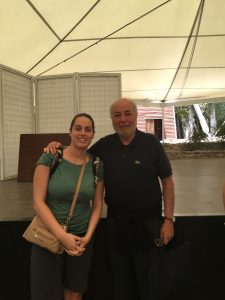J-Term Practica, 2016April 2, 2016

I arrived in Santiago, Chile on Saturday, January 9th, 2016. Swarms of eager taxi drivers outside the airport looked for opportunities to take advantage of unseasoned travelers. It was hot and dry. The urban landscape of Santiago with snowcapped mountains in the background was beautiful and unforgettable.
We met with the Honorable Juan Gúzman, the judge who prosecuted Augusto Pinochet, the Chilean dictator who had been in power for many decades and is responsible for heinous crimes against humanity and the torture, disappearance, and murder of many Chileans. Our time with Judge Gúzman was pivotal in understanding Chile’s transition from a military dictatorship to a modern day democracy. Although the Chilean government has made great strides to embrace and transform into a democracy, it is still under the same constitution from the Pinochet era. The process of creating and transitioning to a new constitution will be lengthy and difficult at best. There are currently three basic human rights still not protected or ensured under the current constitution: health, welfare, and education.
We visited different memorials and museums dedicated to honoring the Chileans that had been tortured, murdered, and disappeared during the military takeover and Pinochet’s reign. It was harrowing hearing of the torture and state-induced fear and murders that went on for decades. There are many who did not want to come forward to tell their stories of torture and abuse because the experience was so traumatic for them. It is important to note that Judge Gúzman comes from a conservative background and from a family that originally supported Pinochet. The weight of the atrocities committed by Pinochet’s regime changed Judge Guzman’s perspective entirely.
We also had the privilege of studying about human rights from Patricia Albornoz, a human rights lawyer with Universidad Bolivariana in Santiago. We learned about the indigenous Mapuche community and the struggles and trials they have faced and are still facing to achieve some level of autonomy and self-governance from the Chilean government. Mapuche means “people of the land” and the well-being and future of their population, culture, language, religion, and community are deeply connected to the land. Albornoz highlighted the importance of personal human development over economic development. How does a state successfully incorporate human rights when creating and establishing public policy?
Chile embraces a free market economy and has privatized: social security, water, transportation, medicine, and education. This has to lead to a highly stratified and closed society with apparent class levels and a huge disparity between the wealthy and the impoverished. In walking through the different and eclectic neighborhoods and sections of Santiago, one can strongly view evidence of a profoundly polarized society. Chile has one of the strongest economies in Latin America and it is important to delve deeper into what sustainable growth means and looks like. We visited an extremely impoverished yet organized shantytown called “La Victoria”. “Este Chile no se vende” said our local tour guide. The heartbeat, strength, and resilience of the Chilean people were greatly evident in La Victoria.
We heard the testimony of Gabriela Zúñiga, whose husband was disappeared during the early era of Pinochet’s regime. Although there have been many searches, her husband or his body have never been found. She remains a strong and committed activist who speaks out against the abuse of human rights and seeks to inform and educate others about the terror and horror of the Pinochet regime. She believes the current Chilean government has not done enough to atone for the atrocities committed.
This trip was exciting and edifying. The Chilean landscapes were beautiful and dramatic and the people were kind, hospitable and generous. I would gladly go back to visit and explore this magical country.



You must be logged in to post a comment.